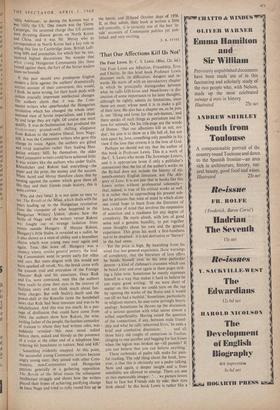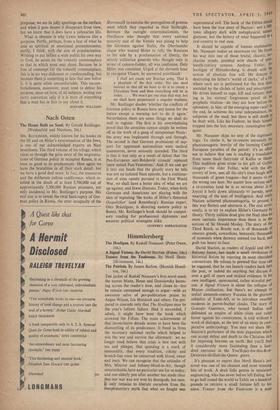`That Our Affections Kill Us Not'
The Four Loves. By C. S. Lewis. (Bles, 12s. 6d.)
THE Four Loves are Affection, Friendship, Eros and Charity. In this brief book Professor Lewis
discusses each, its difficulties, dangers and re- wards. He starts off with an introductory chapter in which he principally distinguishes between what he calls Gift-loves and Need-loves—a dis- tinction of some importance to his later thoughts, although he rightly admits its limitations, since there are many whose need it is to make a gift of their love. He also has a chapter on, as he puts it, our liking and loves•for the sub-human,' and there speaks of such things as patriotism and the love for animals. On his title-page are the words of Donne : 'that our affections kill us not, nor dye'; his aim is to show us a life full of, but not torn apart by, love, something only possible in his view if the love that crowns it is the love of God.
Perhaps we should not say that the author of this book is Professor Lewis. This is a work of the C. S. Lewis who wrote The Screwtape Letters, and it is appropriate (even if only a publisher's convention) that the list of the author's works on the fly-leaf does not include the history of six- teenth-century English literature, nor The Alle- gory of Love. It is not just that in books like this Lewis writes without professorial solemnity— that, indeed, is true of his critical works as well. It is rather that in approaching his present sub- ject he jettisons that state of mind in which alone one could hope to learn from the literature of love, a state of mind that involves the suspension of assertion and a readiness for any degree of complexity. He starts afresh, with lots of good sense and a genuine humility, to put together some thoughts about his own and the general experience. This gives his work a first-handness not to be despised: it is not derivative or 'literary' in the bad sense.
Yet the price is high. By banishing from his mind that less general experience, those warnings of complexity, that the literature of love offers he hands himself over to his own particular demon--a kind of clubnian's crassness which can be heard over and over again in these pages strik- ing a false note. Sometimes he merely expresses himself in a way that makes it hard to believe he can enjoy good writing: 'If we were short of matter on this theme we could turn on the tap by opening the works of the Stoics and it would run till we had a bathful.' Sometimes, particularly in religious matters, he uses some jarringly hearty analogy. Sometimes he throws up the discussion of a serious question with what seems almost a willed superficiality. Having raised the question of the connections, if any, between male friend- • ship and what he calls 'abnormal Eros,' he ends a brief and combative discussion : . . and all those hairy old toughs of centurions in Tacitus, clinging to one another and begging for last kisses when the legion was broken up—all pansies? If you can believe that you can believe anything.'
These outbreaks of padre talk make for pain- ful reading. The odd thing about the book, how- ever, is that this is obviously not a padre talking. Now and again, a deeper insight and a freer sensibility are allowed to emerge. There are one or two memorable images : 4. . we picture lovers face to face but Friends side by side; their eyes look ahead.' In this book Lewis is rather like a
porpoise; we see its jolly sportings on the surface, and when it goes deeper it disappears from view, but we know that it does have a submarine life.
What is obscure is why Lewis behaves like a porpoise. Partly, perhaps, from a fear of what he sees as spiritual or emotional pretentiousness; partly, I think, with the aim of popularisation. Wishing to put before a wide public his own way to God, he seizes on the robustly commonplace as that in which most may share. Because he is free of contempt for the robustly commonplace, this is in no way dishonest or condescending; but because there is something in him that sees below it, it is quite often uncomfortable. This uncom- fortableness, moreover, must tend to defeat his purpose, since on love, of all subjects, writing can carry conviction only if it is born of everything that a man has in him to say about it.
BERNARD WILLIAMS



































 Previous page
Previous page